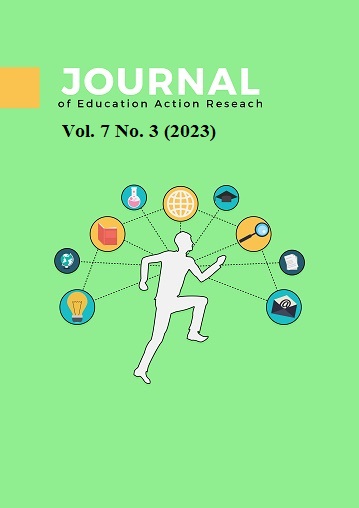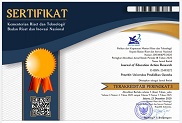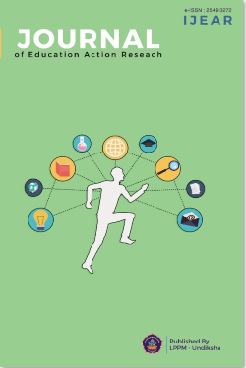PBL-Based Electronic Teaching Materials Using Flip PDF Corporate in Elementary Schools
DOI:
https://doi.org/10.23887/jear.v7i3.67328Keywords:
Electronic Teaching Material, Problem Based Learning, Flip PDF Corporate, ADDIEAbstract
Sejalan dengan perkembangan zaman, maka di perlukan pembelajaran menggunakan bahan ajar elektronik. Guru dituntut untuk dapat memenuhi kriteria pembelajaran yang sesuai dengan perkembangan teknologi. Penelitian ini bertujuan untuk mengembangkan bahan ajar elektronik berbasis Problem Based Learning (PBL) menggunakan flip pdf corporate yang valid. Metode pengembangan menggunakan model ADDIE dengan tahap analisis, desain, pengembangan, implementasi, dan evaluasi. Penelitian ini meliputi metode pengumpulan data lembar validasi dari validator media, validator bahasa, dan validator materi. Pengumpulan data praktikalitas angket respon peserta didik dan guru. Hasil uji validasi media 93.75% masuk kategori sangat valid, hasil validasi materi 93.75% masuk kategori sangat valid, hasil validasi bahasa 95% masuk kategori sangat valid. hasil uji praktikalitas guru 97,14% dengan kategori sangat praktis dan peserta didik 93,7% dengan kategori sangat praktis. Dengan bukti hasil validasi produk dan hasil praktiklitas tersebut disimpulkan bahwa bahan ajar elektronik berbasis PBL menggunakan flip pdf corporate di sekolah dasar adalah valid dan praktis. Penelitian ini berimplikasi pada variasi bahan ajar yang valid untuk menunjang proses pelaksanaan pembelajaran.
References
Abd Razak, A. Z., Surat, S., & Abd Majid, R. (2020). The Design of GIFTED Motivation Module Using the ADDIE Model Approaches Among the Gifted and Talented Students’. International Journal of Academic Research in Progressive Education and Development, 9(2), 20–21. https://doi.org/10.6007/ijarped/v9-i2/7494. DOI: https://doi.org/10.6007/IJARPED/v9-i2/7494
Adifta, E. D., Murni, A., & Roza, Y. (2022). Desain Perangkat Pembelajaran Daring Menggunakna Model Problem Based Learning dengan Pendekatan STEAM pada Materi Barisan dan Deret. PRISMA (Prosiding Seminar Nasional Matematika), 98–105. https://journal.unnes.ac.id/sju/index.php/prisma/article/view/54346.
Ahdhianto, E., Marsigit, Haryanto, & Nurfauzi, Y. (2020). Improving Fifth-Grade Students’ Mathematical Problem-solving and Critical Thinking Skills Using Problem-Based Learning. Universal Journal of Educational Research, 8(5), 2012–2021. https://doi.org/10.13189/ujer.2020.080539. DOI: https://doi.org/10.13189/ujer.2020.080539
Andini, A. R., & Qomariyah, N. (2022). Validasi E-Book Tipe Flipbook Materi Sistem Pencernaan Manusia Berbasis PBL untuk Melatih Kemampuan Berpikir Kritis Siswa SMA’. Berkala Ilmiah Pendidikan Biologi (BioEdu, 11(2), 330–340. https://doi.org/10.26740/bioedu.v11n2.p330-340. DOI: https://doi.org/10.26740/bioedu.v11n2.p330-340
Asrizal, A., Zan, A. M., Mardian, V., & Festiyed, F. (2022). The Impact of Static Fluid E-Module by Integrating STEM on Learning Outcomes of Students. Journal of Education Technology, 6(1), 110–118. https://doi.org/10.23887/jet.v6i1.42458. DOI: https://doi.org/10.23887/jet.v6i1.42458
Daud, K. A. M. (2022). Validity and Realiability of Instrument to Measure Social Media Skills Among Small and Medium Entrepreneurs at Pengkalan Datu River’. International Journal of Development and Sustainability, 7(3), 1026–1037. www.isdsnet.com/ijds.
Devhare, L. D., & Gokhale, N. (2023). In-Silico Anti-Ulcerative Activity Evaluation Of Some Bioactive Compounds From Cassia Tora And Butea Monospora Through Molecular Docking Approach. International Journal of Pharmaceutical Sciences and Research, 14(2), 904–911. https://doi.org/10.13040/IJPSR.0975-8232.14(2).904-11. DOI: https://doi.org/10.13040/IJPSR.0975-8232.14(2).904-11
Erniwati, E. (2022). The Testing of E-Module Flip-PDF Corporate to Support Learning: Study of Interests and Learning Outcomes’. Journal of Education Technology, 6(4), 586–597. https://doi.org/10.23887/jet.v6i4.43857. DOI: https://doi.org/10.23887/jet.v6i4.43857
Fairuzi, O., & Bentri, A. (2021). Pengembangan E-Module Berbasis Aplikasi Flip PDF Corporate Edition pada Bimbingan TIK Kelas VII SMP. Inovtech, 3(2). https://doi.org/10.24036/inovtech.v3i02.211.
García-Ceberino, J. M., Antúnez, A., Ibáñez, S. J., & Feu, S. (2020). Design and Validation of the Instrument for the Measurement of Learning and Performance in Football. International Journal of Environmental Research and Public Health, 17(13), 4629. https://doi.org/10.4135/9781506326139.n240. DOI: https://doi.org/10.3390/ijerph17134629
Hendriani, M., & Gusteti, M. U. (2021). Validitas LKPD Elektronik Berbasis Masalah Terintegrasi Nilai Karakter Percaya Diri untuk Keterampilan Pemecahan Masalah Matematika SD Di Era Digital. Jurnal Basicedu, 5(4), 2430–2439. https://doi.org/10.31004/basicedu.v5i4.1243. DOI: https://doi.org/10.31004/basicedu.v5i4.1243
Ilma, S. (2023). Utilizing ADDIE Model To Develop Semester Instructional Plan Of Reading Course At English Education Department’. PeTeKa (Jurnal Penelitian Tindakan Kelas Dan Pengembangan Pembelajaran, 6(2), 262–275. https://doi.org/10.31604/ptk.v6i2.262-275.
Koltay, T. (2011). The media and the literacies: Media literacy, information literacy, digital literacy. Media, Culture & Society, 33(2), 211–221. https://doi.org/10.1177/0163443710393382. DOI: https://doi.org/10.1177/0163443710393382
Kurnianto, D. (2022). Development of Mathematics E-Modules Through the Professional Flip PDF Application Assisted React Strategy to Improve Problem Solving Ability of Vocational Middle School Students Concentration of Accounting Expertise’. International Journal of Science and Society, 4(3), 499–512. https://doi.org/10.54783/ijsoc.v4i3.544. DOI: https://doi.org/10.54783/ijsoc.v4i3.544
Kusmaryono, I., Wijayanti, D., & Maharani, H. R. (2022). Number of Response Options, Reliability, Validity, and Potential Bias in the Use of the Likert Scale Education and Social Science Research: A Literature Review’. International Journal of Educational Methodology, 8(4), 625–637. https://doi.org/10.12973/ijem.8.4.625. DOI: https://doi.org/10.12973/ijem.8.4.625
Kwangmuang, P., Jarutkamolpong, S., Sangboonraung, W., & Daungtod, S. (2021). The development of learning innovation to enhance higher order thinking skills for students in Thailand junior high schools. Heliyon, 7(6), e07309. https://doi.org/10.1016/j.heliyon.2021.e07309. DOI: https://doi.org/10.1016/j.heliyon.2021.e07309
Malmia, W. (2019). Problem-based learning as an effort to improve student learning outcomes’. International Journal of Scientific and Technology Research, 8(9), 1140–1143. https://www.researchgate.net/profile/Muhamad-Chairul-Basrun-Umanailo/publication/335910617_Problem-Based_Learning_As_An_Effort_To_Improve_Student_Learning_Outcomes/links/5d8338d8458515cbd1985ba6/Problem-Based-Learning-As-An-Effort-To-Improve-Student-Learning-Outcomes.pdf.
McLoughlin, C. (2011). What ICT-related skills and capabilities should be considered central to the definition of digital literacy? In EdMedia+ Innovate Learning, 471–475. https://www.learntechlib.org/p/37908/.
Mee Mee, R. W., Shahdan, T. S. T., Ismail, M. R., Abd Ghani, K., Pek, L. S., Von, W. Y., Woo, A., & Rao, Y. S. (2020). Role of gamification in classroom teaching: Pre-service teachers’ view. International Journal of Evaluation and Research in Education, 9(3), 684–690. https://doi.org/10.11591/ijere.v9i3.20622. DOI: https://doi.org/10.11591/ijere.v9i3.20622
Monica, H., Kesumawati, N., & Septiati, E. (2019). Pengaruh Model Problem Based Learning Terhadap Kemampuan Pemecahan Masalah Matematis dan Keyakinan Matematis Siswa. MaPan (Jurnal Matematika Dan Pembelajaran), 7(1), 155–166. https://doi.org/10.24252/mapan.2019v7n1a12. DOI: https://doi.org/10.24252/mapan.2019v7n1a12
Najuah, N., Sidiq, R., & Lukitoyo, P. S. (2021). The Development Electronic Module Of History Using ADDIE Model’. International Journal of Educational Research & Social Sciences, 6(6), 1658–1663. https://ijersc.org.
Nicholson, S. J. (2015). Evaluating the TOEIC® in South Korea: Practicality, Reliability and Validity’. International Journal of Education, 7(1), 221. https://doi.org/10.5296/ije.v7i1.7148. DOI: https://doi.org/10.5296/ije.v7i1.7148
Puriwat, W., & Tripopsakul, S. (2020). Preparing for industry 4.0-will youths have enough essential skills?: An evidence from Thailand’. International Journal of Instruction, 13(3), 89–104. https://doi.org/10.29333/iji.2020.1337a. DOI: https://doi.org/10.29333/iji.2020.1337a
Rachmadtullah, R., Yustitia, V., Setiawan, B., Fanny, A. M., Pramulia, P., Susiloningsih, W., Rosidah, C. T., Prastyo, D., & Ardhian, T. (2020). The Challenge of Elementary School Teachers to Encounter Superior Generation in the 4.0 Industrial Revolution: Study Literature. International Journal of Scientific and Technology Research, 9(4), 1879–1882. https://www.researchgate.net/profile/Reza-Rachmadtullah/publication/340886839_The_Challenge_Of_Elementary_School_Teachers_To_Encounter_Superior_Generation_In_The_40_Industrial_Revolution_Study_Literature/links/5ea2b9a492851c87d1b1066f/The-Challenge-Of-Ele.
Rikizaputra, R. (2021). Analisis Effect Size Pengaruh Modul Berbasis Sainstifik Pada Pembelajaran Ipa’, LENSA (Lentera Sains. Jurnal Pendidikan IPA, 11(1), 38–46. https://doi.org/10.24929/lensa.v11i1.161. DOI: https://doi.org/10.24929/lensa.v11i1.161
Robandi, B., Kurniati, E., & Puspita Sari, R. (2019). Pedagogy In The Era Of Industrial Revolution 4.0. 239, 38–46. https://doi.org/10.2991/upiupsi-18.2019.7. DOI: https://doi.org/10.2991/upiupsi-18.2019.7
Rohmah, F. N., & Bukhori, I. (2020). Pengembangan Media Pembelajaran Interaktif Mata Pelajaran Korespondensi Berbasis Android Menggunakan Articulate Storyline 3. ECOEDUCATION (Economic & Education Journal), 2(2), 169–182. https://doi.org/10.33503/ecoducation.v2i2.892 DOI: https://doi.org/10.33503/ecoducation.v2i2.892
Sani, I. N., Bahar, A., & Elvinawati, E. (2020). Perbandingan Model Pembelajaran Problem Solving Dan Problem Based Learning Terhadap Kemampuan Berpikir Kritis Siswa Kelas Xi Mia Man 2 Kota Bengkulu. Alotrop, 4(2), 107–116. https://doi.org/10.33369/atp.v4i2.13834. DOI: https://doi.org/10.33369/atp.v4i2.13834
Saputra, M. D., Joyoatmojo, S., Wardani, D. K., & Sangka, K. B. (2019). Developing Critical-Thinking Skills through the Collaboration of Jigsaw Model with Problem-Based Learning Model. International Journal of Instruction, 12(1), 1077–1094. https://doi.org/10.29333/iji.2019.12169a. DOI: https://doi.org/10.29333/iji.2019.12169a
Shahroom, A. A., & Hussin, N. (2018). Industrial Revolution 4.0 and Education. International Journal of Academic Research in Business and Social Sciences, 8(9). https://doi.org/10.6007/ijarbss/v8-i9/4593. DOI: https://doi.org/10.6007/IJARBSS/v8-i9/4593
Shelton, K., & Saltsman, G. (2006). Using the Addie Model for Teaching Online’. International Journal of Information and Communication Technology Education (IJICTE, 2(3), 14–26. https://doi.org/10.4018/jicte.2006070102. DOI: https://doi.org/10.4018/jicte.2006070102
Spante, M., Hashemi, S. S., Lundin, M., & Algers, A. (2018). Digital competence and digital literacy in higher education research: Systematic review of concept use. Cogent Education, 5(1), 1519143. https://doi.org/10.1080/2331186X.2018.1519143. DOI: https://doi.org/10.1080/2331186X.2018.1519143
Sriyanti, I., Almafie, M. R., Marlina, L., & Jauhari, J. (2021). The effect of Using Flipbook-Based E-modules on Student Learning Outcomes. Kasuari: Physics Education Journal (KPEJ), 3(2), 69–75. https://doi.org/10.37891/kpej.v3i2.156. DOI: https://doi.org/10.37891/kpej.v3i2.156
Sulaiman, A., & Azizah, S. (2020). Problem-Based Learning Untuk Meningkatkan Kemampuan Berpikir Kritis Di Indonesia: Sebuah Tinjauan Literatur Sistematis. PEDAGOGIK: Jurnal Pendidikan, 7(1), 107–152. https://doi.org/10.33650/pjp.v7i1.792. DOI: https://doi.org/10.33650/pjp.v7i1.792
Sulistyaningrum, H., Winata, A., & Cacik, S. (2019). Analisis Kemampuan Awal 21st Century Skills Mahasiswa Calon Guru SD. Jurnal Pendidikan Dasar Nusantara, 5(1), 142. https://doi.org/10.29407/jpdn.v5i1.13068. DOI: https://doi.org/10.29407/jpdn.v5i1.13068
Susanti, E. D., & Sholihah, U. (2021). Pengembangan E-Modul Berbasis Flip Pdf Corporate Pada Materi Luas Dan Volume Bola. RANGE: Jurnal Pendidikan Matematika, 3(1), 37–46. https://doi.org/10.32938/jpm.v3i1.1275. DOI: https://doi.org/10.32938/jpm.v3i1.1275
Tilova, S. N. (2022). Pengembangan Bahan Ajar Tematik Terpadu Menggunakan Aplikasi Flip PDF Corporate Berbasis RADEC di Kelas V SD’. Journal of Basic Education Studies, 5(1), 1099–1110. https://www.ejurnalunsam.id/index.php/jbes/article/view/5490.
Verma, N. S., & Banerji, H. (2023). A Comparative Review of India and USA’s Approach to Brownfield Redevelopment’. Indian Journal of Environmental Protection, 43(4), 291–303. https://doi.org/10.1016/j.ijnurstu.2013.06.009. DOI: https://doi.org/10.1016/j.ijnurstu.2013.06.009
Wang, Z., Cai, L., Chen, Y., Li, H., & Jia, H. (2021). The Teaching Design Methods Under Educational Psychology Based on Deep Learning and Artificial Intelligence. Frontiers in Psychology, 12. https://doi.org/10.3389/fpsyg.2021.711489. DOI: https://doi.org/10.3389/fpsyg.2021.711489
Winda, N. (2016). Implementasi Kurikulum 2013 dalam Pembelajaran Bahasa Indonesia Berbasis Teknologi Informasi dan Komunikasi’. Dan Pengajarannya, 1(1), 87–94. https://doi.org/10.33654/sti.v1i1.343. DOI: https://doi.org/10.33654/sti.v1i1.343
Yoshino, R. T., Pinto, M. M. A., Pontes, J., Treinta, F. T., Justo, J. F., & Santos, M. M. D. (2020). Educational Test Bed 4.0: a teaching tool for Industry 4.0. European Journal of Engineering Education, 45(6), 1002–1023. https://doi.org/10.1080/03043797.2020.1832966. DOI: https://doi.org/10.1080/03043797.2020.1832966
Zinnurain, Z. (2021). Pengembangan E-Modul Pembelajaran Interaktif Berbasis Flip Pdf Corporate Edition Pada Mata Kuliah Manajemen Diklat. Academia: Jurnal Inovasi Riset Akademik, 1(1), 132–139. https://doi.org/10.51878/academia.v1i1.546. DOI: https://doi.org/10.51878/academia.v1i1.546
Downloads
Published
How to Cite
Issue
Section
License
Copyright (c) 2023 Shalsabillah Putri Andava Andava

This work is licensed under a Creative Commons Attribution-ShareAlike 4.0 International License.












